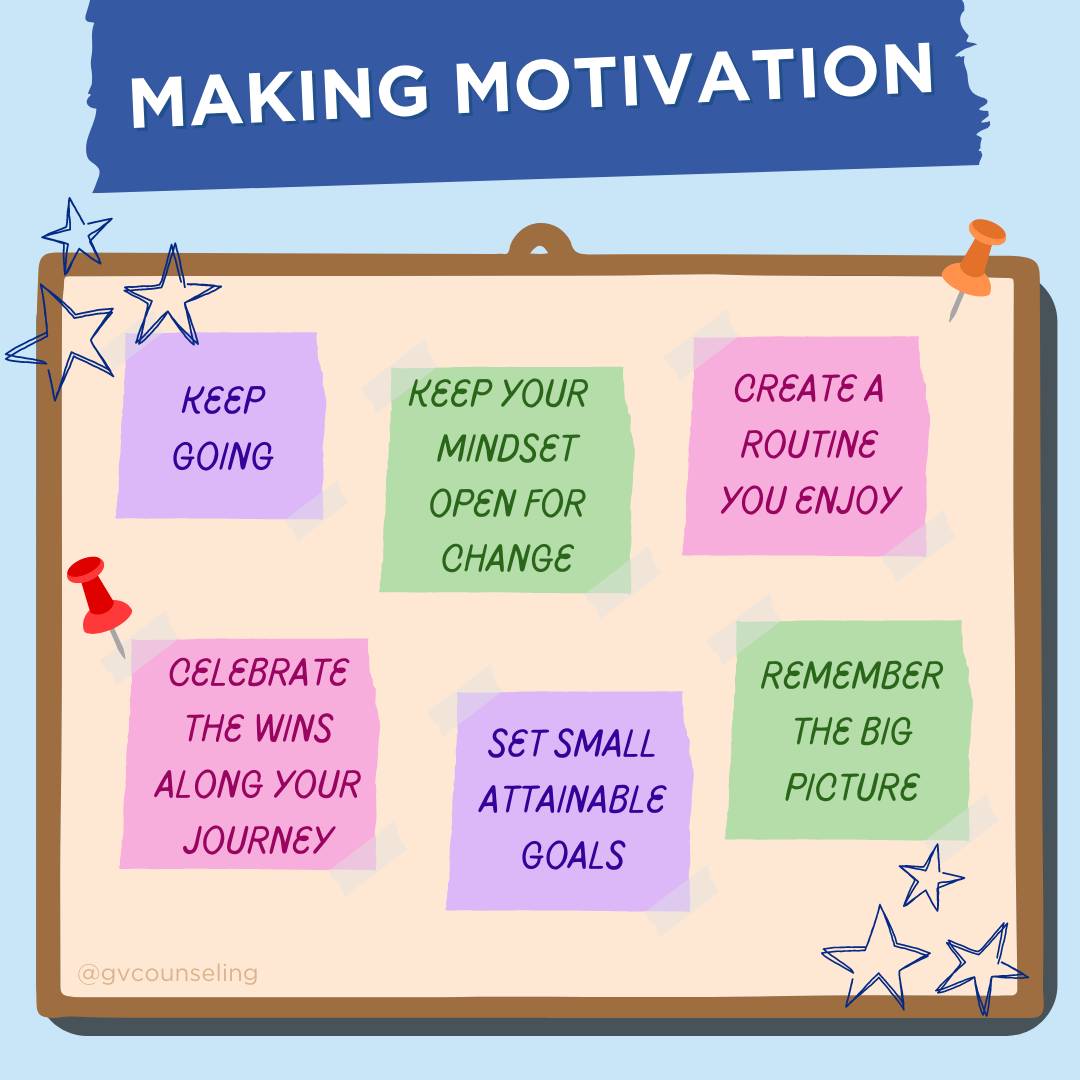Mental Health Communications Toolkit: January
Building Resilience
Resilience describes one's ability to cope with a difficult event and adapt in situations of adversity. Resilience is likely already within you, and there are a few ways to strengthen this skill and positively impact your mental health moving forward! A few strategies that are useful in flexing your resiliency include:
- Building your connections. Prioritize positive relationships that make you feel fulfilled, and join groups of people with similar interests and values who can encourage you to be your best self! Practice this strategy by letting your loved ones know how much you appreciate them.
- Finding your purpose. Actively moving towards your goals and helping others along the way is a great way to stay focused, motivated, and fulfilled. Practice this strategy by setting a routine for what you need to get done in a day or week, and check back to ensure your schedule aligns with your values and priorities.
- Embracing healthy and helpful thoughts. Maintaining a positive look and approaching challenge with curiosity and openness can encourage growth. Practice this strategy by asking a professor how to improve when you receive a low grade on a paper or exam.
Is it more than just "feeling blue"?
All of us experience feelings of sadness and fatigue from time to time. When these concerns start to become constant and impact our ability to carry out daily activities, it could be that one is experiencing depression. Difficulties related to being a college student including academic pressure, difficulties with interpersonal relationships, managing financial concerns, and more, can exacerbate symptoms of depression.
Some signs to be aware of in yourself or others that may be reason to seek mental health support include:
- Feeling low, down, or "out of it" for longer than normal
- Persistent feelings of sadness or worthlessness
- Difficulties with concentration, memory, or decision-making
- Thoughts about death or suicide
- Insomnia
- Significant change in weight and/or eating behaviors
- Physical symptoms such as digestive issues or aches and pains
If you or another student are struggling with depression, the University Counseling Center is here to help. Schedule an appointment to speak with a clinician within 1-2 business days.
How to Get Motivated for a New Semester
The beginning of a new semester can feel overwhelming! Looking through new syllabi, figuring out how your class and work schedule will fit together, and wanting to invest time in a new hobby can bring stress, as well as excitement. Check out a few tips from the University Counseling Center for getting motivated to make this semester the best one yet!
- Clean up your space. Tidying up your surroundings and maintaining a clean and calming environment can help uncloud your mind as well. Plus, this will get the ball rolling and check one (or a few) things off your to-do list!
- Introduce yourself to those sitting near you in your classes. A familiar face you can reach out to when you forget a deadline, or when tackling the end-of-semester project is a helpful way to stay on track, and make a new friend on campus in the process. Bonus points if it's a class in your major (who said networking has to be tough)!
- Make time for fun. Your calendar shouldn't only have color-coded due dates. Take a look at which weekends look free, and plan out some of your favorite ways to de-stress and recharge!
- Use what works for you. Odds are, you've already built some systems and strategies that have gotten you to this point. Use your personal strengths and systems to your advantage! For example, if you do your best work at night, set up a routine that allows you to sleep in a tad later, and eat a nutritious dinner before diving into your assignments.

World Religion Day
World Religion Day is celebrated on the third Sunday in January each year, and serves as a reminder of the need for harmony and understanding between all religions and faith systems. On this day, communities of different faiths have the opportunity to gather together, listen to one another, and celebrate. For more than 70 years, World Religion Day has honored the 4,200 religions around the world, and been recognized by billions across the globe. To observe World Religion Day in your own way this year, check out some of the recommendations provided by the University Counseling Center!
- Attend an Interfaith event hosted on campus to gain self-awareness and understanding of others, too!
- Self-reflect by journaling about how religion, faith, or spirituality impacts you.
- Engage with a different belief system from your own by doing your own research, watching a movie that features another culture, or listening to a podcast.
- Learn more about the spiritual dimension of wellness.
- Get involved in a faith-based organization in the community.
MLK Jr. Day
On the third Monday of January we celebrate the life and legacy of Rev. Dr. Martin Luther King Jr. His famous "I Have a Dream" speech is marked as a notable event in U.S. History, along with his important leadership in the Civil Rights Movement. Rev. Dr. Martin Luther King Jr. was a key figure in moving our society towards the creation of the Civil Rights Act of 1968, prohibiting legalized discrimination and segregation.
GVSU embraces opportunities to create and maintain an environment that values diversity and inclusion. For more information on resources, events, and more, visit gvsu.edu/mlk.

Managing Emotions While Applying to Graduate School
Applying to graduate school is one that is deeply personal, and can bring about different feelings for each individual. However, one thing all can agree on is that the process is stressful! The University Counseling Center encourages you to try out some of the tips below to help manage some of these emotions.
- Take the time to pause and challenge yourself to become aware of what you're feeling. It's natural to say we're feeling stressed as a catch-all for a range of other emotions, including disappointment, hopefulness, rejection, anxiety, and more. Take a moment to ground yourself in the present and look inwards to see, what are you feeling--really?
- Challenge unhelpful thoughts like, "There's no way I'm going to get in." with ones fueled by self-compassion. An example could be, "I did the absolute best I could, and grew throughout this experience."
- Reflect on your journey to this point with an attitude of gratitude. Is there someone you could reach out to to thank for the positive impact they had on your educational experience?
- Take care of yourself by assessing each dimension of wellness. Eating nutritious foods, spending time with those who make us feel comfortable and safe, and listening to our bodies are all ways to fill up our cups.
Self-advocacy Tips for Medical or Mental Health Appointments
Feeling heard and understood when you’re seeking medical care or mental health support is incredibly important for effective treatment. It can be a frustrating experience when it feels like our needs are not being met, and it can also feel uncomfortable at first to advocate for ourselves. Check out the following tips below to learn how to improve your self-advocacy skills, because you matter and so does your health!
-
Prepare for appointments: Preparing ahead of time can help reduce anxiety when you feel overwhelmed and help you think about what information you want to get from the appointment. Write down a list of questions to bring with you to your appointment and bring a support person with you if you’d like to help increase your confidence.
-
Ask questions: It is your right as a patient to ask questions to better understand your treatment. Asking follow-up questions and asking for the doctor to rephrase their answers are great ways to improve communication between you and your provider. Asking your doctor for resources to learn more about your health concerns is also helpful for understanding new language that is specific to your concern, and for ensuring you get accurate information during your own research.
-
Keep records: Keep records of documents, assessments, doctor letters, and fees/payments. You can ask hospitals for an itemized list of services provided, which is helpful for making sure you are only paying for the services you receive. If you speak to someone on the phone at an agency, write down their name and title. Another part of record keeping is tracking your symptoms. Keeping a log of your symptoms is great for helping your doctor understand your experience, and can be important for navigating insurance to provide proof that you need care.
-
Provide feedback: Identify your health goals and let your doctor know if you don’t feel like you are making progress toward them. Remember that you and your doctor are a team and that providing feedback is an essential part of collaboration.
For more tips, visit the University Counseling Center’s Referral Guide for help with navigating insurance, finding a provider, figuring out if a provider is a good fit, and for sample scripts to use when contacting a provider.

